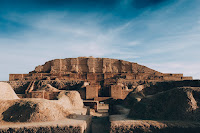Transitory Power

Only God’s kingdom will prevail and endure. All other political powers and regimes are fleeting. Already they are passing away . Despite human pretensions, History demonstrates without exception the impermanence of political power, human ideologies, and governments. Rome endured for a thousand years, but that Empire fell all the same. Like human life, political power is impermanent, and regimes and even the greatest empires collapse unexpectedly and often quickly when their allotted time expires. Only the “ Kingdom of God ” will endure forever.




